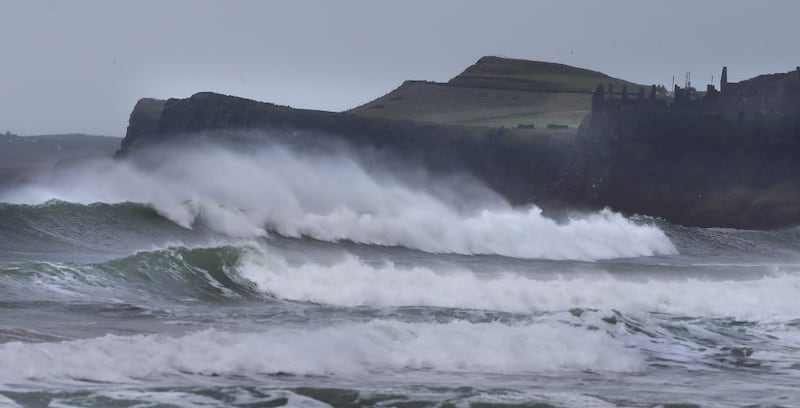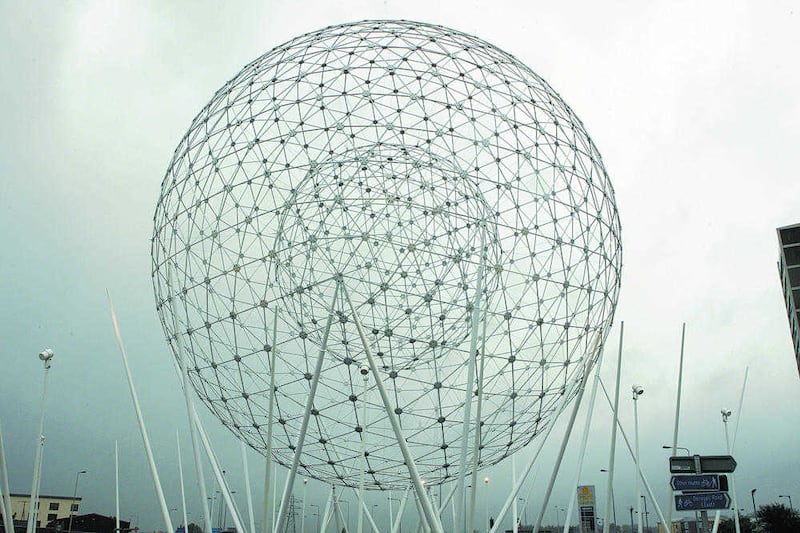A woman has been treated in hospital following injury after scaffolding collapsed in Belfast city centre during strong winds brought on by Storm Isha that have also left tens of thousands of homes without power.
Amid a yellow weather warning for wind, and ahead of a “tornado warning” for later in the evening, scaffolding in Belfast’s Castle Lane area came down on Sunday afternoon.
Police closed the area off to pedestrians and a PSNI spokesperson said: “A member of the public has been struck by falling debris and is being treated at the scene by emergency services in attendance.”
A spokesperson for the Northern Ireland Ambulance Service said two crews were despatched to the scene.
“Following assessment and initial treatment at the scene, one patient was taken by ambulance to Royal Victoria Hospital,” they added.
The yellow warning for wind was upgraded to amber at 6pm on Sunday, with gusts of up to 70mph expected in some inland areas, and up to 90mph in exposed coastal and hilly areas, leading to tens of thousands of homes being left without electricity.
The amber warning remains in place until 6am on Monday, however a yellow warning for the north is in place until noon on Wednesday, with likely gusts of between 50 and 60mph.
⚠️ Weather warnings for #StormIsha have been updated ⚠️
— Met Office (@metoffice) January 21, 2024
Latest info 👉https://t.co/QwDLMfRBfs
Here are the latest details 👇 pic.twitter.com/bMRIkFZR9r
On Sunday evening, the PSNI said they were dealing with “numerous reports of fallen trees across the road network”.
A spokesperson added: “Please only travel if your journey is necessary, exercise caution and be prepared for obstructions.”
In Derry, the Foyle Bridge was closed due to the strong winds.
The Met Office has warned that damage to roofs and power lines is a possibility as winds increase in force.
The Department for Infrastructure has issued a travel warning, advising that the conditions “could lead to debris on the roads, fallen trees, flooding and spray or large waves on exposed and vulnerable coastal areas”.
A spokesperson added: “Conditions could lead to traffic disruption and the public are being asked to consider their journeys and if travelling are advised to take extra care and exercise caution given the risk of obstructions on the roads.
@metofficeNI amber&yellow wind warnings. Possible travel disruption. Exercise extreme caution if travel is necessary: risk of debris/fallen trees, flooding, spray, large waves in coastal areas. Industrial action may disrupt clean up. https://t.co/CFhGBmVJ4Y pic.twitter.com/XMg50WfVNu
— Department for Infrastructure (@deptinfra) January 21, 2024
“Due to the potential for large waves, flooding of coastal roads is also possible - please remember not to drive through flood water.”
A “tornado watch” zone was also issued for the north, as well as parts of Scotland and northern England, by the Tornado and Storm Research Organisation (Torro) on Sunday afternoon.
It means a “strong tornado” is possible in those regions, but the Met Office has advised any tornado - although with the potential to cause significant damage - would be isolated and likely would not last very long.
By Sunday evening, around 45,500 homes across the north had experienced power outages, with NIE Networks saying emergency crews were working to respond to reports.
A spokesperson said: “Hundreds of extra staff have been brought in to help reinforce our normal capability. Our Incident Management Centre at Craigavon has been opened, as have Local Incident Centres in locations across Northern Ireland to allow our teams to co-ordinate a localised response.
”We have mobilised additional call agents to deal with any queries customers may have regarding the repair process in their area.”
As winds increased on Sunday afternoon, a majority of evening departures were cancelled, along with flights due to arrive at Belfast City Airport.
A spokesperson for Belfast International Airport said that its evening flights were scheduled, but “could be impacted” during the evening.
Ferry services from Belfast and Larne were cancelled on Sunday, with Monday crossings also expected to face disruption or cancellations.

Meanwhile in the Republic, a Status Red wind warning was issued for counties Donegal, Galway and Mayo.
Met Eireann said “extremely strong” winds and “destructive gusts” were expected in the three counties on Sunday, particularly in coastal and exposed areas.
By 8.35pm on Sunday, it was estimated over 170,000 homes in the Republic were without power, with the worst impacted counties including Mayo, Galway, Roscommon and Kerry.
ESB Networks said that the majority of affected homes would remain without power overnight into Monday.
Paul Rock, who chaired a meeting of the National Emergency Coordination on Sunday morning to coordinate the Irish government’s response, said it was a “particularly nasty” storm.
“We don’t want anyone dying as a result of this storm,” Mr Rock said on RTE Radio.
“So we want people to heed the public safety messaging.”
He asked the public to stay away from all coastal areas for the duration of the Met Eireann warnings, all road users to be aware of hazardous driving conditions including debris, and urged people not to touch fallen electricity wires.
⚠️Status Red - Wind warning for Galway, Mayo, Donegal
— Met Éireann (@MetEireann) January 21, 2024
• Dangerous coastal conditions with high waves
• Treacherous travelling conditions
• Risk of significant and widespread power outages
More details here⬇️https://t.co/Xg3aMJlyuS pic.twitter.com/HS92EYcUs0
Dozens of flights at Dublin Airport were cancelled on Sunday, while thousands of homes were left without power.
The red warnings are in place from 5pm to 9pm on Sunday in Galway and Mayo, and from 9pm on Sunday until 1am on Monday in Donegal.
A Status Orange wind warning remained in place across the Republic from 4pm or 5pm on Sunday until 2am or 3am on Monday.







